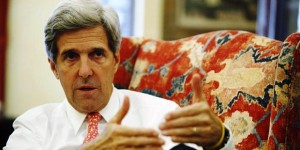 US officials have snubbed Israel’s pressure aimed at dissuading Washington from engaging with Iran over Tehran’s nuclear energy program.
US officials have snubbed Israel’s pressure aimed at dissuading Washington from engaging with Iran over Tehran’s nuclear energy program.
“We have an obligation. It would be diplomatic malpractice of the worst order not to examine every possibility of whether or not you can achieve that before you ask people to take military action and do what you have to do in order to prevent something from happening,” said US Secretary of State John Kerry.
US Defense Secretary Chuck Hagel also said, “I think we are wise, if the Iranians have reached out - which they have - to, in a very clear-eyed way - and we are - test their actions with their words.”
The two US officials made the comment during a joint press conference with Japan’s Foreign Minister Fumio Kishida in Tokyo on Thursday.
Kerry also said the US would not take any Iranian offer at “face value” and that Tehran will have to prove its transparency about its nuclear energy program.
Both officials, however, reaffirmed Washington’s support for Israel in case of what they called a security threat.
The comments come after Israeli Prime Minister Benjamin Netanyahu delivered a speech at the United Nations General Assembly on October 1, threatening unilateral military action against Iran to destroy the country’s civilian nuclear facilities.
He repeated his baseless accusation that Tehran is seeking to develop nuclear weapons, saying, “Iran wants to be in a position to rush forward to build nuclear bombs before the international community can detect it and much less prevent it.”
A day before his UN speech, Netanyahu also met with US President Barack Obama. During the meeting, Netanyahu asked Obama to toughen the sanctions against the Islamic Republic if it continues what he called a nuclear weapons program.
Netanyahu’s attempts to pressure the US came after President Hassan Rouhani of Iran held a telephone conversation with his American counterpart Barack Obama on September 27 in the first direct communication between an Iranian and a US president since Iran’s Islamic Revolution of 1979.
The US, Israel, and some of their allies have repeatedly accused Iran of pursuing non-civilian objectives in its nuclear energy program.
Tehran has categorically rejected the allegation, arguing that as a signatory to the Non-Proliferation Treaty (NPT) and a member of the International Atomic Energy Agency (IAEA), it is entitled to develop nuclear technology for peaceful purposes.
By Press TV
The Iran Project is not responsible for the content of quoted articles.

 QR code
QR code